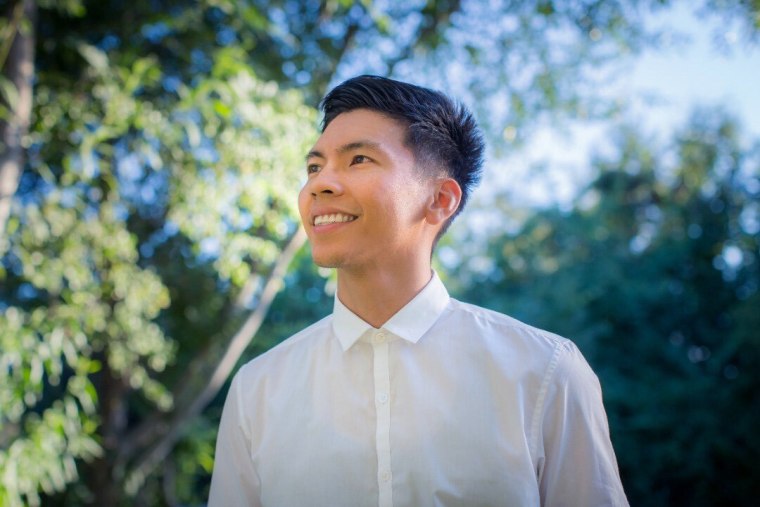Kenneth Mejia, an accountant and leftist community activist, made history in Los Angeles when he declared victory in the city controller race Tuesday night, becoming the city’s first Filipino elected official and the first Asian American to assume citywide office.
He held a 21-point lead over City Councilmember Paul Koretz when Koretz conceded Wednesday.
“We have a very diverse population in L.A. and I feel very proud and honored to represent that community,” Mejia, 32, told NBC Asian America. “Coming from a minority background makes you more empathetic about the people you’re fighting for.”
Many Angelenos see Mejia’s landslide victory over Koretz, a centrist and City Hall veteran, as a rejection of establishment politics. In addition to leading Koretz by more than 100,000 votes, he also had more votes than either mayoral candidates as of Thursday evening.
A former organizer for the L.A. Tenants Union, Mejia ran on a progressive platform centered around decriminalizing homelessness and holding the police and other city departments accountable. He’s pledged to audit the cost of homeless encampment sweeps and make recommendations on alternative responses that prioritize housing and services. On the climate side, he’s proposed analyzing how much the city pays oil and gas companies for power and evaluating the progress of Mayor Eric Garcetti’s Green New Deal.
“We want to change the system against which community organizers are fighting and make it better for working-class people,” he said.
The role of the controller, which Mejia described as “the city’s accountant and paymaster,” can be obscure and overlooked compared to more high-profile posts on the City Council. Unlike the mayor or city councilors, the controller cannot pass laws or alter the city budget. Mejia said such limitations are precisely what makes his role so powerful and so well-suited to his background as a certified public accountant and organizer.
“You don’t really have to push an agenda when you’re running to present data and show numbers,” he said. “They have a story in themselves.”
To make the budget more fun and accessible to voters, Mejia’s team leveraged social media and other digital tools to create infographics and TikTok reels explaining how the city is spending taxpayer dollars. Mejia’s two corgis are the stars of his TikToks, some of which have garnered more than a quarter-million views.
Repackaging financial data in digestible, visual mediums was the key to engaging young voters, Mejia said. His campaign bought billboards plastered with graphs displaying the chasm between the city budget for the Los Angeles Police Department and those for housing and youth development programs. In a cheeky TikTok, Mejia placed three pieces of kibble in front of one of his corgis, who’s captioned “youth development,” and a fistful of kibble in front of the other, who’s captioned “police.”
“We found that the traditional way of campaigning was ineffective in reaching people,” he said.
As a political outsider, Mejia also experienced some tense moments during the campaign. He drew backlash for remarks he’d made in 2020 as a then-Green Party member, including a now-deleted tweet calling then-Democratic Party Presidential nominee Joe Biden a “rapist” and “racist.” Mejia has previously said the tweet is a “non-story” and that he understood that the role of a politician is different from that of an activist.
In some ways, Mejia has already begun doing the work of a controller while running for the job.
When the City Council voted in August to crack down on homeless encampments within 500 feet of schools and day care centers, he decided to calculate the total number of facilities that would be affected by the ban. His campaign built a digital map of some 1,900 schools and day care centers in L.A. and estimated that 20% of the city’s sidewalks would now be closed to camping.
“I want to use the office to show how the status quo is not working for everyone,” he said.
